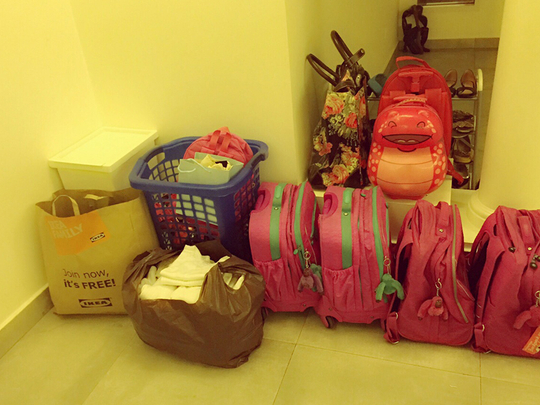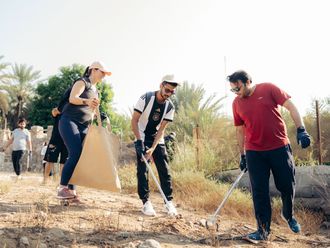
Dubai: Surrounded by her daughters, Salama Al Hebsi, an Emirati mother of four, places piles of clothes, school uniforms and school supplies on the floor to begin the sifting process.
Salama’s eldest daughters, Hessa and Atheeja, aged nine and eight, eagerly lend their mother a helping hand as she stacks the necessities to be made available for those less fortunate. Their participation in the process, Salama believes, is crucial to their understanding of the concept of generosity and compassion.
“I make an effort to include my daughters in the process [of donation] so that they learn at a young age to give and to be generous,” said Salama. She is also firm in her belief about the condition of the items being donated. “They must be in perfect condition,” she insists. “I teach [my children] that when donating to those who are less privileged.”
Every year, in the spirit of Ramadan especially, her daughters keep aside a portion of every dish they eat for their house help before the call to prayer.
“I emphasise this even before we place our spoons or forks in the food. We all end our fast together and it’s not leftovers, but freshly cooked food,” she explains.
Food is also sent, a pot of biryani, to the mosque during the call to prayer for those who don’t have food for iftar. If there is food remaining at home after everyone has eaten, the girls ensure they pack it properly in containers and send it to the mosque.
Salama is happy that the habit of giving is present in her family and her daughters are also exposed to it. For example, they observe their aunt giving with no limits, an influence that is beneficial for them to be exposed to.
“My sister collects money from family members and with it she buys food essentials during Ramadan, such as rice, porridge [oats] and seasoning cubes, and puts them into boxes to give to workers,” she explains.
“Apart from the food, I also get my daughters into the routine of saving at least a dirham a day from their allowance which their father then donates to someone at the end of the week when he goes for Friday prayers,” she says.
This discipline, believes Salama, helps her daughters grow up to give without reservation throughout the year and not just during the month of Ramadan. Giving to the needy and having mercy on the poor, zakat, is a pillar of Islam and her daughters need to learn this at a young age.
Unconventional giving
Though food and financial aid are the most common forms of giving, there are several acts of generosity that can also impact others’ lives if a little attention is paid to the details. Salama encourages her daughters to create boxes, with each box containing a checklist and a calendar for prayer timings, a sticker for every sura they memorise and a puzzle with a picture of Al Aqsa Mosque or the Kaaba for them to complete.
“These boxes have a religious value for my daughters and so they like to extend that value to their friends,” Salama explained.
By giving their friends these boxes, her daughters are encouraging them to attend to their religious duties of praying and reciting from the Quran. Similarly, Mariam Abdullah, a university student, says that while financial aid is a common form of generosity, she opts for other forms.
“My kind of giving is giving my time and lending an ear to a friend in need of support or giving people advice, something of value for them to use in times of need,” said Mariam.
Throughout Ramadan, the young Emirati looks forward to donating to charities. “But, more importantly” she says, “I want to educate people during Ramadan on how to maintain a healthy lifestyle, especially in such extreme weather conditions.”
As a young Emirati, she recalls growing up in a community that constantly nurtured the spirit of giving.
“It came naturally to me when I grew up, to give without deliberating, because it was emphasised in school by my teachers and at home by my parents,” said Mariam. “We were always taught to put others before ourselves.”












